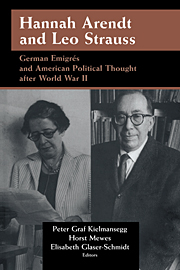Book contents
- Frontmatter
- Introduction
- PART I HANNAH ARENDT
- PART II LEO STRAUSS
- 4 Reflections on Leo Strauss and American Education
- 5 Leo Strauss: The Quest for Truth in Times of Perplexity
- 6 Leo Strauss and Martin Heidegger: Greek Antiquity and the Meaning of Modernity
- 7 Leo Strauss: German Origin and American Impact
- 8 The Modern World of Leo Strauss
- PART III ROUNDTABLE DISCUSSION
- Select Bibliography of Works by Arendt and by Strauss on Modern Political Science and Philosophy
- Index
4 - Reflections on Leo Strauss and American Education
Published online by Cambridge University Press: 05 January 2013
- Frontmatter
- Introduction
- PART I HANNAH ARENDT
- PART II LEO STRAUSS
- 4 Reflections on Leo Strauss and American Education
- 5 Leo Strauss: The Quest for Truth in Times of Perplexity
- 6 Leo Strauss and Martin Heidegger: Greek Antiquity and the Meaning of Modernity
- 7 Leo Strauss: German Origin and American Impact
- 8 The Modern World of Leo Strauss
- PART III ROUNDTABLE DISCUSSION
- Select Bibliography of Works by Arendt and by Strauss on Modern Political Science and Philosophy
- Index
Summary
What follows are reflections on Leo Strauss's role in and contribution to the debates over American education, particularly the character of his defense of liberal education. In entering the American educational scene, Strauss entered a forum in which a revolution in education had been underway since the second half of the nineteenth century, parallel in its own way to educational changes in Great Britain and Europe. Strauss did not invent, and did not claim to invent, the issues about liberal education in a democratic culture on which he spoke. But he did present himself as both a critic and a friend of American democracy and, in so doing, clarified his conception of the role of the philosopher in the polity. His views on both liberal education and the philosopher's role were indicative also of how he understood the practical implications of the issue of natural right and history.
My reflections were stirred not long ago when, as I was composing this essay, I attended the annual August conference of all faculty and staff at my college which starts the new academic year. It is customary on that occasion to introduce new faculty. Among those introduced there were a geologist who specializes in the dynamics of sand dunes, a professor of dance, a specialist in eighteenth-century French literature who also studies contemporary Francophone literature of the Caribbean, a computer scientist, a topologist, specialists in Asian and Middle Eastern politics, Byzantine art, physiological psychology, Soviet history, contemporary U.S. history, eighteenth-century English satire, and genetics, and a philosopher who has translated and written a commentary on Plato's Sophist.
- Type
- Chapter
- Information
- Hannah Arendt and Leo StraussGerman Émigrés and American Political Thought after World War II, pp. 61 - 80Publisher: Cambridge University PressPrint publication year: 1995
- 1
- Cited by



